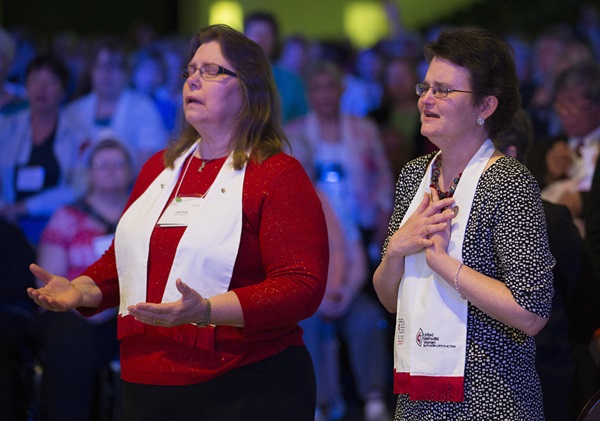For those called to lifetime ministry, a supportive community is crucial to the ability to fulfill the mission of taking the Gospel to the world. Many deaconesses and home missioners say their covenant community and relationship with the church are what keep them going as they attempt to be Jesus in a tangible way.
Matt Morgan, a home missioner in Hartford, Conn., says this camaraderie has encouraged him in his efforts to reduce homelessness.
"I see people who get burned out in this type of work or ministry," he says. "There's something about having the lifelong commitment with the church that helps sustain that calling. It helps secure my ability to be able to live a fulfilling life by serving."
Journey Home, the nonprofit where Morgan works, aims to improve the system of services for those experiencing homelessness. The approach is "no single agency or person can work on this issue alone," Morgan says.
"I knew that I felt called to do this for the rest of my life," he says of becoming a home missioner. "Right now, my calling is to this social justice work with the issue of homelessness."
The office of Deaconess and Home Missioner, a division of United Methodist Women, "enables laity to respond to a vocational call to be Christ in the world through consecration for lifetime servant ministries of love, justice and service."
"It is important that we have a variety of ways that people can be equipped to live out their call," says Becky Louter, executive of the Office of Deaconess and Home Missioner. "We believe that it's very important that you look at all the relationships available in The United Methodist Church and decide what fits best with the calling in your heart."
Often, deaconesses (women) and home missioners (men) say they felt called to ministry but not to ordination. The lifetime commitment of being a deaconess or home missioner – serving within or outside the church – for many turns out to be the perfect opportunity.
Morgan learned about home missioners and deaconesses while working with the General Board of Global Ministries. "It just seemed like it was the perfect fit," he says, formalizing his commitment to ministry and offering "an affirming endorsement from the church, blessing that commitment and affirming my calling."
Discerning a call from God to full-time mission-oriented service as part of the lay diaconate is the first step for United Methodists who become deaconesses and lay missioners.
Educational requirements include preparation for the specific area of ministry and core studies in Bible, theology of mission and United Methodist history, polity and doctrine.
After approval of a candidate for the office by United Methodist Women, a bishop consecrates and commissions lay missioners and deaconesses and appoints them to a place of service determined in consultation between United Methodist Women and the bishop.
They continue to be part of the covenant community of deaconesses and home missioners. As laity, they become members of local churches in the conferences in which they serve.
Garlinda Burton, who retired in 2012 from full-time work in church agencies, had felt called to ministry since childhood. About five years ago, she began to learn about being a deaconess from some women she knew.
"I loved the idea, and it sounded like, ‘This is who I am. I think I am a deaconess,'" she says. "Ever since I put one foot out on the journey, it's as if this was what I was meant to do the whole time."
Consecrated in April and commissioned in June, Burton immediately jumped into her new role to begin the Gordon Memorial Freedom School in Nashville, Tenn.
"The ZIP code in which Gordon is located — 37208 — is the poorest in Nashville," Burton says. "I want to help start freedom schools in Nashville, offering free after- school programs and services that are available to help children improve their pride in community and their love of reading and love of the written and spoken word."
There is tremendous diversity among deaconesses and home missioners, says Louter, whose mother was a deaconess in Georgia during the Civil Rights Movement. Some have seminary degrees; others work in science, agriculture or engineering. Still others work in ecumenical ministries or public service professions.
Jeff Murrell, a home missioner in Washington, uses his engineering degree to "promote energy conservation awareness and environmental stewardship."
Working for the U. S. Department of Energy, Murrell has served in Afghanistan, where he helped "reduce the amount of spending for oil and gasoline and, at the same time, promote conservation among the soldiers."
Murrell views his work as following Scripture.
"Throughout Psalms, it talks about the earth is not ours. The earth is the Lord's," he says. "One of the ways to be a better Christian is to be a better steward. Let's have a greater awareness of this beautiful planet that God has given us."
Deaconesses and home missioners live their calls in different ways, but they find common bonds in their commitment to one another and the church.
"The role that the home missioner and deaconess community can play in the church," Morgan says, "is helping the church meet the mission that we are called to in the Gospel because it provides the strength and resources and the support system."
Burton is grateful for the experiences she has already had as a deaconess, teaming up with other laity and clergy.
"We are in partnership with clergy," she says, "and in partnership with Christ to do gospel work, transforming work in the world."
Emily Snell is a freelance writer based in Nashville, Tenn.
Learn more about the office of deaconess and home missioner at www.unitedmethodistwomen.org/dhm.
Originally published in Interpreter Magazine, September–October, 2014.

